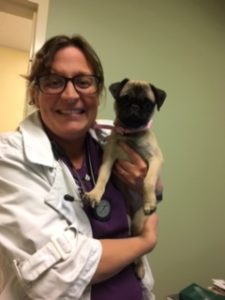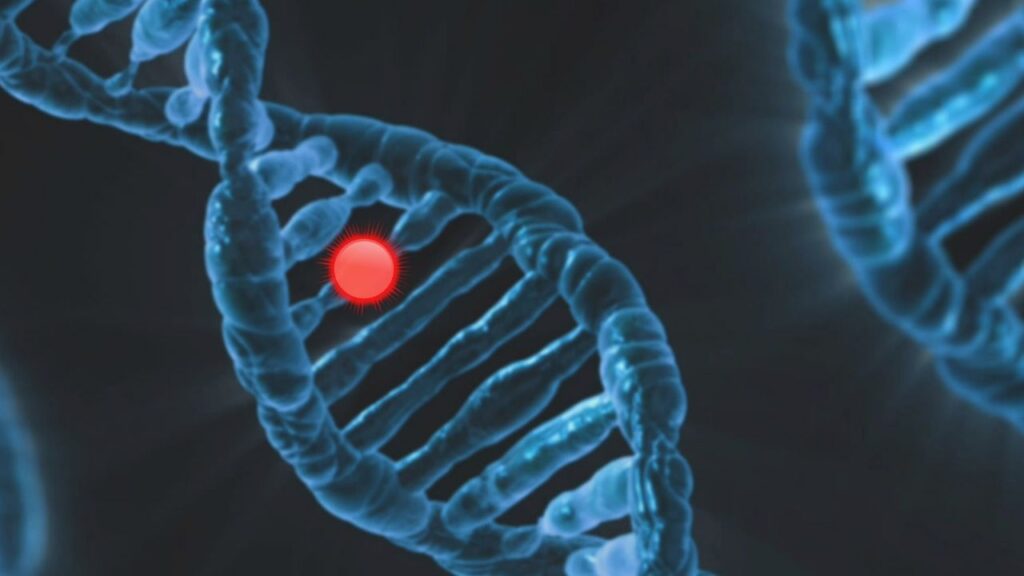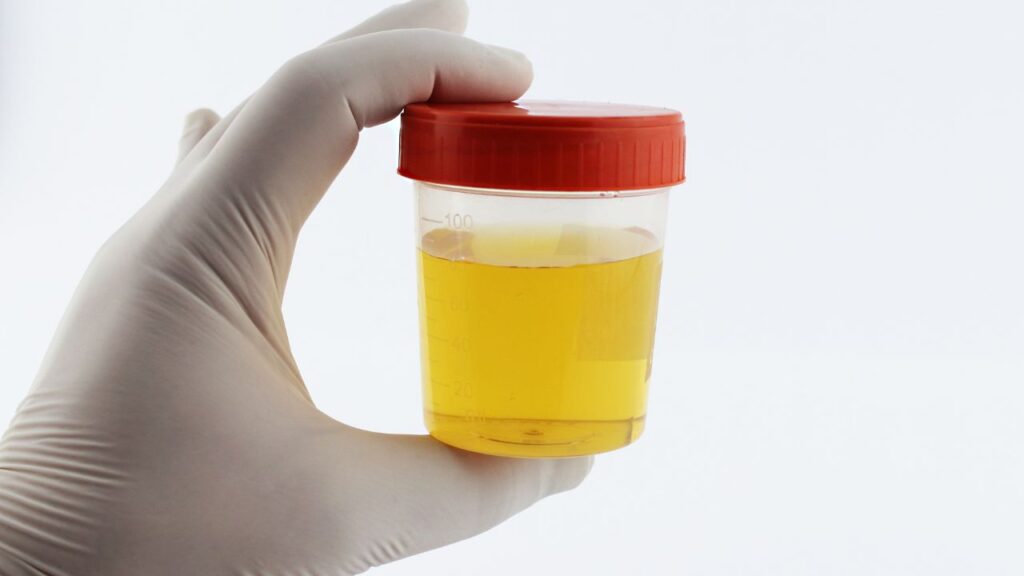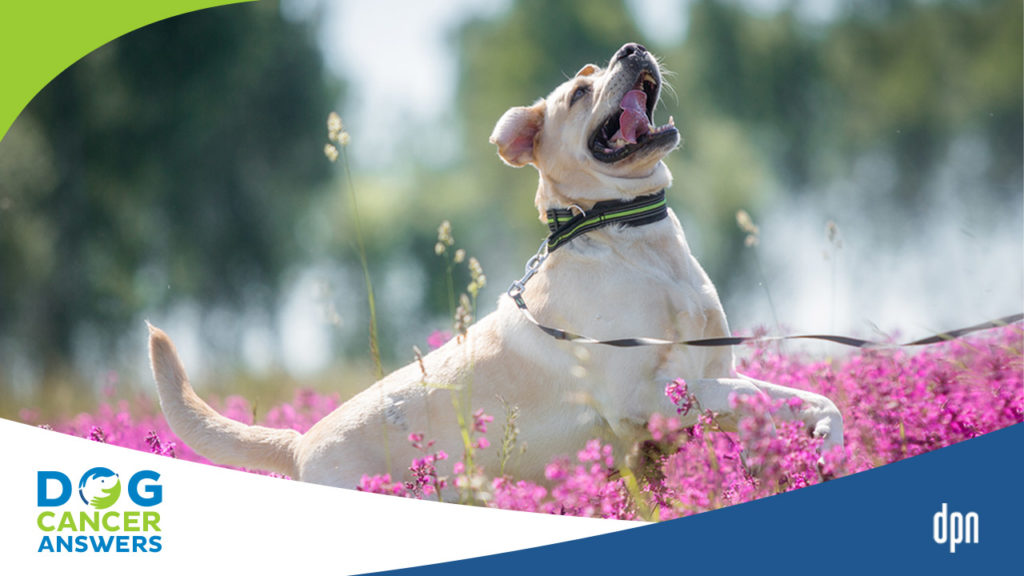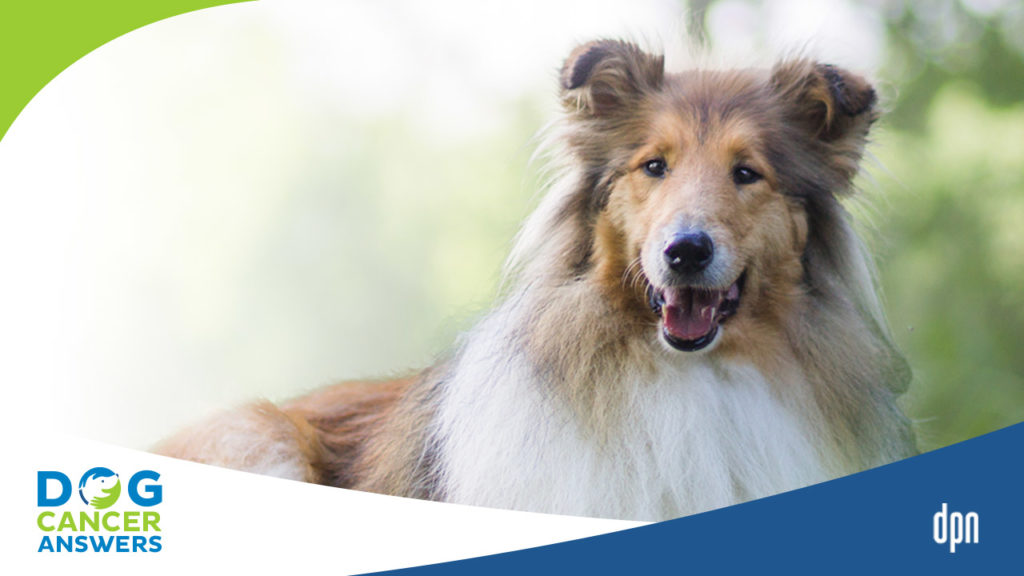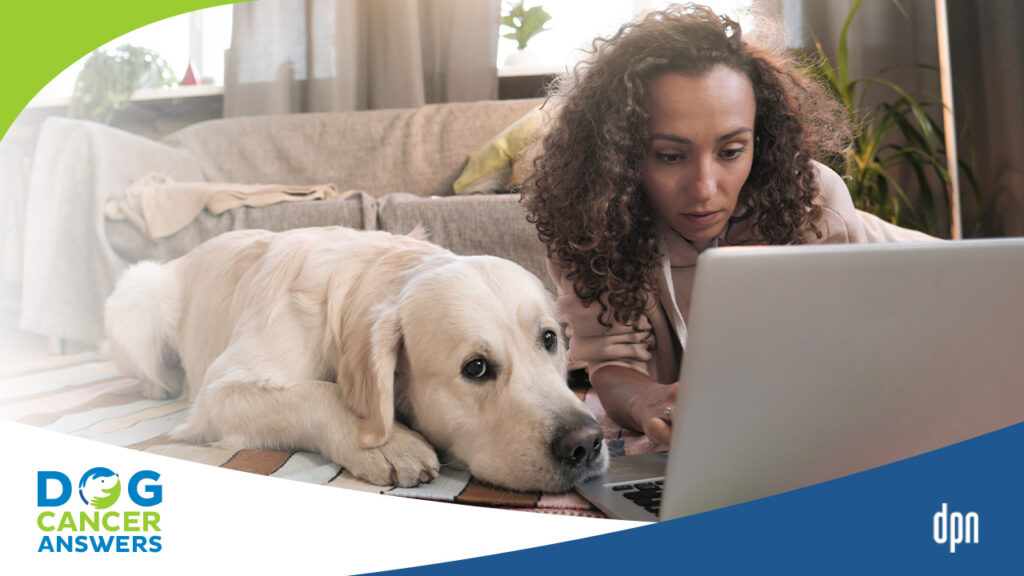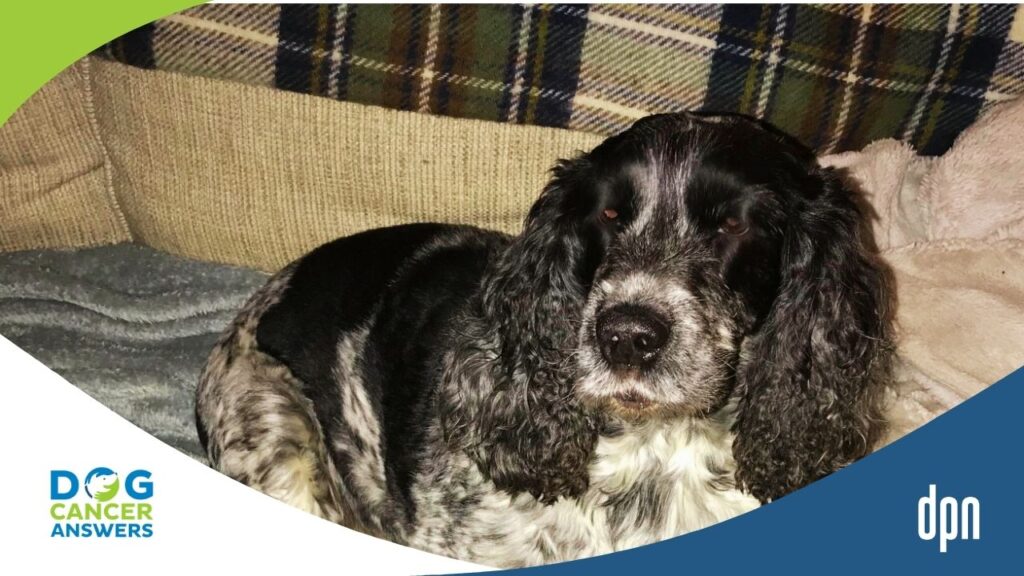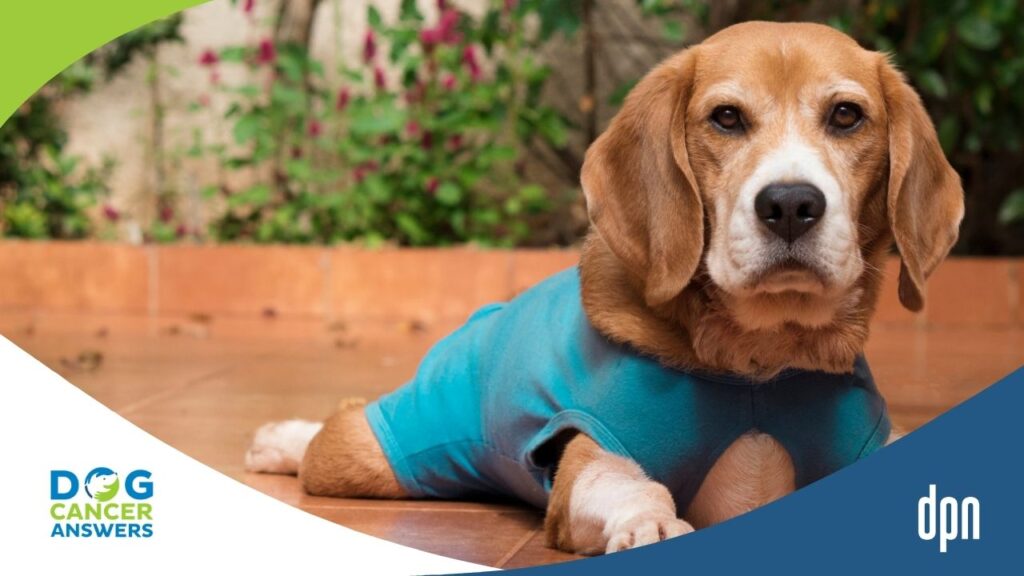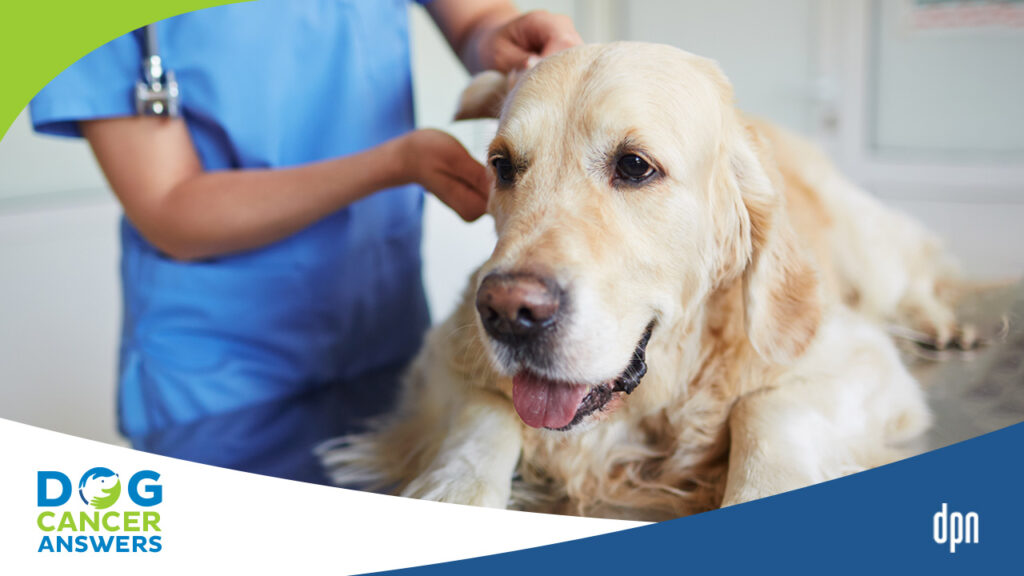>> Dr. Lauren Barrow: I have a hard time believing there’s anything in his environment that was so toxic that gave his young healthy dog bladder cancer and no one else is sick.
>> Announcer: Welcome to Dog Cancer Answers, where we help you help your dog with cancer.
>> Molly Jacobson: Hello friend, thanks for joining us today for a ListenerLine episode.
Patrick wrote to us with some questions and desperately in need of support for his very young dog with a bladder mass. To answer his questions. We’re joined once again by veterinarian, Lauren Barrow, Dr. Barrow. Thank you so much for joining us.
>> Dr. Lauren Barrow: Thank you for having me.
>> Molly Jacobson: Patrick sent his question in by email. So I’ll read it. Hi, after recent ultrasound, my one year old Irish Setter is confirmed to have a bladder mass, three and a half centimeters by two centimeters. It is near the trigone region, impeding ability to urinate. We sent in the BRAF test and are awaiting the cystoscopy appointment.
One, can you estimate chances this is transitional cell carcinoma? If it is, is there any chance of long term survival? Two, is it unheard of at the age of one? If caused by environmental factors, is it possible to develop it in such a short time frame of exposure? I understand the genetic component, but only have info from the breeder stating the line of 55 total dogs all free of TCC and only two others presented with cancer after the age of 10. I feel terrible and hope it was not anything we allowed him to be exposed to. Thank you for your time and any resources you can provide.
Poor Patrick. Dr. Barrow, I know you understand that pain of feeling guilty about, was it me? So let’s start there. Let’s start with that question.
>> Dr. Lauren Barrow: I am very certain he did not do this to his dog. So, as far as TCC specifically, we don’t know exactly what causes it, any more than we know exactly what causes any cancer. There may be some genetic components as he was talking about certain breeds tend to get it more often. I know I’ve noticed that pattern. I didn’t think Irish Setter was one of them, but there have been some studies where they were looking at exposure to toxins.
There’s one that I ran into about some sort of lawn herbicide that maybe increased that. There’s other risk factors that you’ll see repeatedly. Urban living, which they think might be linked to toxins in our environment. Obesity, which is probably more of an inflammatory kind of side effect. So there’s certain things that you’ll see popping up over and over with cancer in general that may or may not apply to TCC.
And one thing that I have always thought was very interesting about dog cancer and human cancer is that we have pretty similar rates of cancer. Pretty similar types, pretty similar treatments. And that’s because we evolved in the same environment. We share a lot of the same environment. And so, I don’t think that there, I don’t know Patrick, but I have a hard time believing there’s anything in his environment that was so toxic that gave his young, healthy dog bladder cancer and no one else is sick.
That would be proof of my guess that he did not cause this. And the fact that his, basically puppy, got cancer is one of the big tragedies of cancer. It does not care. We study trends and we think we know certain things about what makes a cancer more likely, what’s a risk factor, and it’s things like age and toxins, and we’re always looking for a reason.
But sometimes it’s just a bad luck mutation. Who knows? Wrong place, wrong time. It takes one cell to not get the memo that it was supposed to die at the end of its life to clone itself and make a tumor and wreak havoc, and have catastrophic, heartbreaking results. And that’s the nature of cancer, and that’s why we hate it so much. And I’m sorry that happened. It’s heartbreaking, but you can’t blame yourself. It’s not your fault. You did everything right. I could tell.
>> Molly Jacobson: That’s right.
>> Dr. Lauren Barrow: He cares.
>> Molly Jacobson: Yeah. Patrick, you didn’t do anything wrong. Cancer is one of our oldest diseases. And we had a genetics expert, Dr. Charlotte Hacker. We spoke to her just a couple of weeks ago for the show, and she said the same thing. There’s all of these systems in the body that double check, should this cell divide. And there’s all these checkpoints that the cell has to go through. And one step in those multiple systems can cause cancer. Every day, every cell is going through these checkpoints and it just takes one time, one mistake, and it’s really unfair.
>> Dr. Lauren Barrow: It is.
>> Molly Jacobson: So it’s not something you can be control of. It’s at a cellular level. And there’s multiple checkpoints.
>> Dr. Lauren Barrow: Right? And I think also that the *griefs *of having someone you love have cancer, part of that is that you get some guilt. Almost everyone will. I’ve experienced that myself, but also had a lot of clients that, you know, they brought their dog or their cat to me and they want to know what they did wrong.
What should I have done differently? I want to get another puppy, but I don’t want the same thing to happen again. Should we move? I’ve been giving him filtered water now, like, you didn’t do this. This is mean science happening again.
>> Molly Jacobson: Right.
>> Dr. Lauren Barrow: It is what it is, but you can’t take that on yourself. All you can do is appreciate every day. And if you are unlucky enough, your dog, your cat, your loved one is unlucky enough to get hit with that super, super bad luck, then you do the best you can every day and you run with it, but don’t live in the past and question yourself. And I think it’s fine you ask the breeder because if they did come up with some sort of a, genetic link, or yeah, all of our puppies have TCC. I think that we should go figure out why.
>> Molly Jacobson: Right.
>> Dr. Lauren Barrow: And do a study on that line of dogs.
>> Molly Jacobson: Yeah.
>> Dr. Lauren Barrow: And figure out what is going on there, because that’s not what we find. You know, I think he was doing his due diligence, and he was probably operating on some guilt and some automatic love responses there, grief, working to call them up. But I don’t want him to carry that around. That’s not fair.
>> Molly Jacobson: Okay, let’s pause just for a quick second here, and we’ll be right back with Dr. Lauren Barrow.
We’re back with Dr. Lauren Barrow. So what do you think the odds are that this bladder mass, he said three and a half centimeters by two centimeters, in the trigone area, that’s impeding the dog’s ability to urinate. Why do we think it’s going to come back? Do you think it’s going to come back as a TCC diagnosis? Gut feeling?
>> Dr. Lauren Barrow: Probably.
>> Molly Jacobson: Yeah.
>> Dr. Lauren Barrow: Probably.
>> Molly Jacobson: Yeah.
>> Dr. Lauren Barrow: The age aside and breed aside, everything else points to TCC. I looked it up before on Veterinary Information Network, they said that more than half or up to 70 percent of bladder tumors, so bladder mass of any sort in a dog is a TCC. They also tend to grow near the trigone, which is right, the little point where the urine comes out. And I think the BRAF test is a good follow up to try and confirm that. It will come up positive. I think 85 percent.
>> Molly Jacobson: Yeah.
>> Dr. Lauren Barrow: Accuracy. Is that right? I think.
>> Molly Jacobson: Yeah.
>> Dr. Lauren Barrow: I don’t have it in front of me, but something like that.
>> Molly Jacobson: We have an article. We’ll put a link.
>> Dr. Lauren Barrow: Okay.
>> Molly Jacobson: But yeah.
>> Dr. Lauren Barrow: The links are saving me.
>> Molly Jacobson: Oh, the links are so great. Right. We have all of these.
>> Dr. Lauren Barrow: I can’t remember numbers after work.
>> Molly Jacobson: Right? We have all of these amazing articles written by you and other veterinarians on our team that have done the research and write it down so all of us can remember accurately have a place to go look it up. Yeah.
>> Dr. Lauren Barrow: Thank goodness. So without my crystal ball in front of me, I would say probably, it probably is.
>> Molly Jacobson: Yeah, probably. So then what are we looking for in terms of he wants to know what are his chances of long term survival with TCC?
>> Dr. Lauren Barrow: So long term can be a loaded question.
>> Molly Jacobson: Yeah. What does that mean?
>> Dr. Lauren Barrow: I tend to compare dog cancer stuff to human cancer stuff. And long term survival in the human world is 5, 10, 50 years. Like, if this is the equivalent of a one year old dog being a human, what’s that, like 5, 7, 10? A child getting cancer, long term survival for that child is gonna be, you know, 50, 80 years. We’re not gonna get that in the dog because we don’t. And it’s not fair. So if you’re trying to evaluate long term survival with most cancers, I think most of us would agree. I’d be pretty happy to get a couple of years, maybe.
And I think you ask a hundred different people, you’ll get a hundred different answers as to what’s a good long term survival. And that’s the tragedy of your dog’s youth having cancer versus a 10 or a 15 year old dog having cancer, is all of that lost life years. So when he asked long term survival for his one year old, I wonder what that means to him. Is he asking, can we kick it and live a normal lifespan? I would be really surprised. I think there’s a pretty good chance, no. Could we get a long enough survival time to have some really good months and if we’re lucky and kind of aggressive with it, a couple of good years.
Sure. I think that we’ve got some really good options these days. I think it depends on if it’s spread or not. I think it’s worth looking into. I would, again, go to the oncologist, always plug in for them because there’s so many different variables in there. And ironically, the fact that he’s young and otherwise healthy, and I assume doesn’t have other concurrent illnesses. Maybe we’ll help him be a little bit stronger, and he can, you know, exceed expectations with the treatment because the data that we have maybe isn’t that great because this type of tumor is fairly aggressive.
But that’s also an average, a mean, a median, whatever you’re looking at. That’s not everybody. So there’s always hope there. As long as there’s hope there. So.
>> Molly Jacobson: That’s an excellent point that statistics don’t apply to individuals ever.
>> Dr. Lauren Barrow: Right.
>> Molly Jacobson: So whatever number you’re hearing is not actually your dog’s number. Your dog’s number is what you will find out.
>> Dr. Lauren Barrow: Right. And also dogs don’t read textbooks or studies.
>> Molly Jacobson: That’s why we love them.
>> Dr. Lauren Barrow: That’s part of the reason I keep my dogs around. So this is a really horrible, sad situation that Patrick and his family, and they’re going to have to deal with and, you know, balance your your heart and your mind with this whole situation. And it’s gonna suck sometimes, but go out there get your answers, get your information. See what the BRAF tests, cystoscopy The other thing is, you know, yeah, it’s probably TCC, but probably isn’t a hundred percent either. So let’s get the info. Let’s see what happens. That’s what I would say. One step at a time.
>> Molly Jacobson: Well, Dr. Lauren Barrow, thank you so much for joining us today and taking Patrick’s question. We so appreciate your heart and your insights.
>> Dr. Lauren Barrow: Well, thank you. Thanks for having me. It’s always fun to talk to you guys.
>> Molly Jacobson: And thank you, listener, for listening and also to Patrick, of course, for giving his question. We always appreciate listener questions because they help us make good shows for other dogs. Dog cancer is not a fun subject, but when we do what we can to help people understand more, we’re shining a little light in that darkness, and that’s what you can do right now by calling our listener line and asking a question we can use as a future show.
Now you can ask any question, including ones that you had at the beginning of your cancer journey that were answered, but you think other people would also like to know. Call (808) 868-3200, and maybe we’ll use your question in a future show.
That’s it from all of us here at Dog Podcast Network. I’m Molly Jacobson wishing you and your dog a very warm Aloha.
>> Announcer: Thank you for listening to Dog Cancer Answers. If you’d like to connect, please visit our website at DogCancer.com or call our listener line at (808) 868-3200. And here’s a friendly reminder that you probably already know, this podcast is provided for informational and educational purposes only. It’s not meant to take the place of the advice you receive from your dog’s veterinarian.
Only veterinarians who examine your dog can give you veterinary advice or diagnose your dog’s medical condition. Your reliance on the information you hear on this podcast is solely at your own risk. If your dog has a specific health problem, contact your veterinarian. Also, please keep in mind that veterinary information can change rapidly, therefore, some information may be out of date.
Dog Cancer Answers is a presentation of Maui Media in association with Dog Podcast Network.
